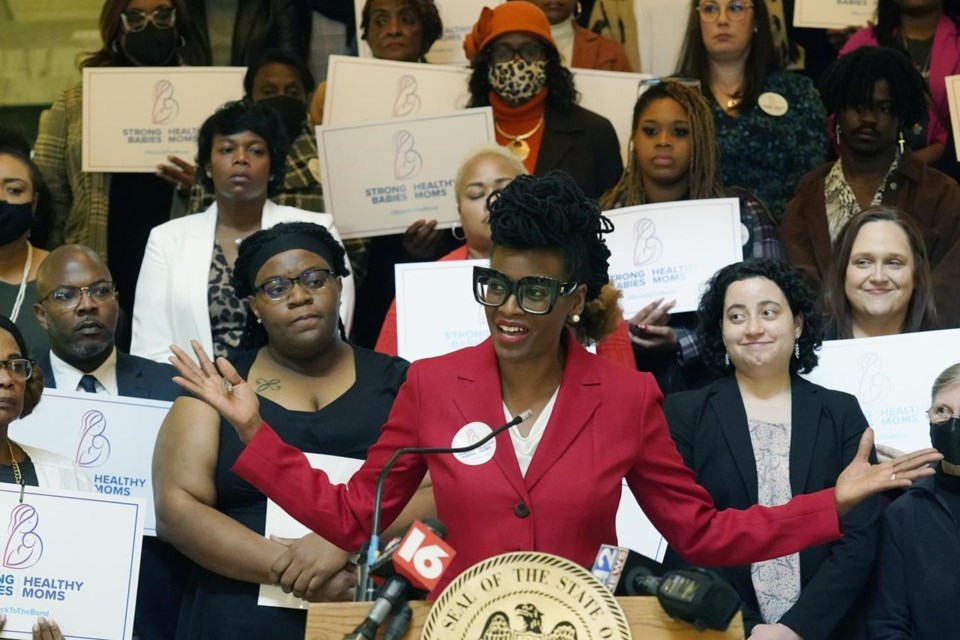JACKSON, Miss. (AP) — Deaths from pregnancy complications have become more prevalent in Mississippi, and racial disparities in the health of those who give birth have widened in recent years, according to a report released Thursday by the state's Department of Health.
The Mississippi Maternal Mortality Report shows that the maternal mortality rate increased by 8.8% between 2013‐2016 and 2017‐2019, with the latter period being the most recent one analyzed by researchers.
Black, non-Hispanic women had a rate four times higher than white, non-Hispanic women. Meanwhile, the rate increased by 25% for Black women while falling 14% among white women. Of the maternal deaths directly related to pregnancy, 87.5% were determined to be preventable.
The grim figures arrive as the state is expecting more births each year as a result of the U.S. Supreme Court decision last summer overturning the 1973 Roe v. Wade ruling, which had established a nationwide constitutional protection for abortion. The court used a Mississippi case to overturn the case, a legal effort the state's leaders have lauded.
Mississippi's Republican-controlled state legislature has been debating whether to extend Medicaid coverage from 60 days to a full year after childbirth, a policy supported by State Health Officer Dr. Dan Edney and some other leaders.
“It is imperative that we take care of our most vulnerable populations now," Edney said Thursday in a statement. “This is the only way we can move Mississippi’s health status off the bottom of the chart.”
Lt. Gov. Delbert Hosemann has also supported extending postpartum coverage, a position that puts him at odds with state House Speaker Philip Gunn, a fellow Republican.
“We won the pro-life case and now we don’t want to take care of our moms? I can’t understand how you are able to make that kind of argument,” Hosemann said at a Jan. 18 news conference.
State senators voted last year for an extension, but it failed in the House amid opposition from Gunn. The speaker has said this year that he would back it only if it is supported by the state Division of Medicaid.
To compile the report released Thursday, a committee of doctors and nurses reviewed 93 deaths, 40 of which were determined to have been pregnancy‐related. It found that 42.5% of the maternal deaths it identified occurred more than 60 days but less than one year after delivery.
Additionally, the committee found that 82.5% of the women who died due to pregnancy complications between 2017 and 2019 were Medicaid recipients.
According to the report, most of the deaths among Black, non-Hispanic mothers were attributed to cardiovascular conditions. Edney said increased access to healthy foods could reduce the prevalence of health issues that lead to cardiovascular disease.
Advocates from the Mississippi Black Women’s Roundtable, an advocacy group, gathered at the Capitol to urge lawmakers to extend postpartum coverage.
“Women of color in our state have some of the country’s highest infant and maternal mortality rates,” said Cassandra Welchlin, the group’s executive director. "We will not only be changing policy, but we’ll also be saving precious lives.”
At a Jan. 13 legislative hearing, Edney said the state doesn’t have the medical workforce to address a wide range of poor health outcomes. Mississippi has the nation’s highest fetal mortality, infant mortality and pre-term birth rates.
___
Michael Goldberg is a corps member for the Associated Press/Report for America Statehouse News Initiative. Report for America is a nonprofit national service program that places journalists in local newsrooms to report on undercovered issues. Follow him on Twitter at twitter.com/mikergoldberg.
Michael Goldberg, The Associated Press



